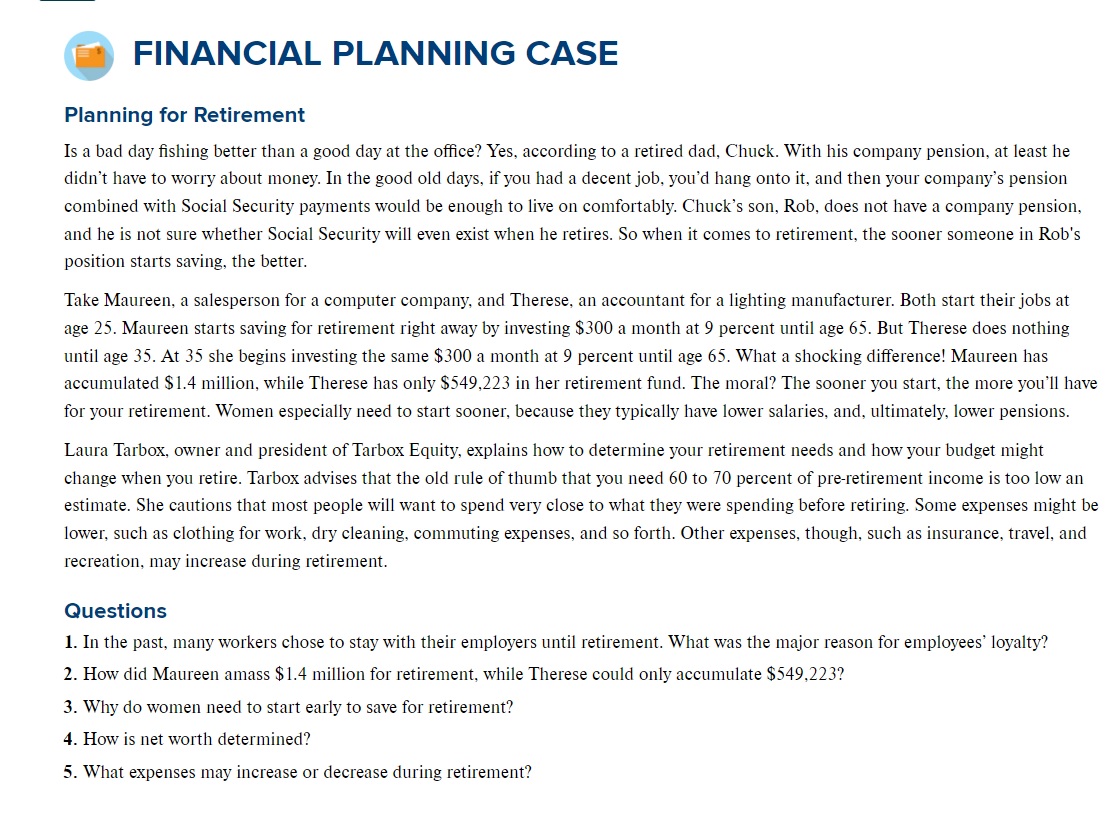Answered step by step
Verified Expert Solution
Question
1 Approved Answer
(NOTES FROM TEACHER): For questions 1, 2, and 3, I am looking for a paragraph containing your answer and the logic behind your choice. In

(NOTES FROM TEACHER): For questions 1, 2, and 3, I am looking for a paragraph containing your answer and the logic behind your choice. In question 4, an equation will be sufficient. To answer question 5, you need to provide at least two expenses, one that decreases and one that increase AND, this is the most important part, WHY you think those increases/decreases will occur.
Is a bad day fishing better than a good day at the office? Yes, according to a retired dad, Chuck. With his company pension, at least he didn't have to worry about money. In the good old days, if you had a decent job, you'd hang onto it, and then your company's pension combined with Social Security payments would be enough to live on comfortably. Chuck's son, Rob, does not have a company pension, and he is not sure whether Social Security will even exist when he retires. So when it comes to retirement, the sooner someone in Rob's position starts saving, the better. Take Maureen, a salesperson for a computer company, and Therese, an accountant for a lighting manufacturer. Both start their jobs at age 25. Maureen starts saving for retirement right away by investing $300 a month at 9 percent until age 65 . But Therese does nothing until age 35 . At 35 she begins investing the same $300 a month at 9 percent until age 65 . What a shocking difference! Maureen has accumulated $1.4 million, while Therese has only $549,223 in her retirement fund. The moral? The sooner you start, the more you'll have for your retirement. Women especially need to start sooner, because they typically have lower salaries, and, ultimately, lower pensions. Laura Tarbox, owner and president of Tarbox Equity, explains how to determine your retirement needs and how your budget might change when you retire. Tarbox advises that the old rule of thumb that you need 60 to 70 percent of pre-retirement income is too low an estimate. She cautions that most people will want to spend very close to what they were spending before retiring. Some expenses might be lower, such as clothing for work, dry cleaning, commuting expenses, and so forth. Other expenses, though, such as insurance, travel, and recreation, may increase during retirement. Questions 1. In the past, many workers chose to stay with their employers until retirement. What was the major reason for employees' loyalty? 2. How did Maureen amass $1.4 million for retirement, while Therese could only accumulate $549,223 ? 3. Why do women need to start early to save for retirement? 4. How is net worth determined? 5. What expenses may increase or decrease during retirementStep by Step Solution
There are 3 Steps involved in it
Step: 1

Get Instant Access to Expert-Tailored Solutions
See step-by-step solutions with expert insights and AI powered tools for academic success
Step: 2

Step: 3

Ace Your Homework with AI
Get the answers you need in no time with our AI-driven, step-by-step assistance
Get Started


